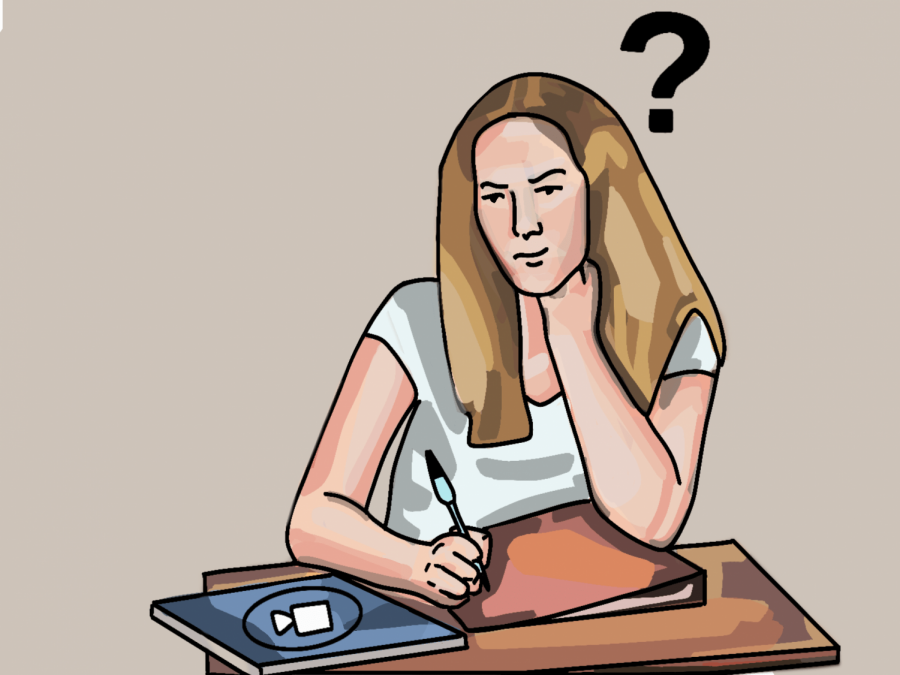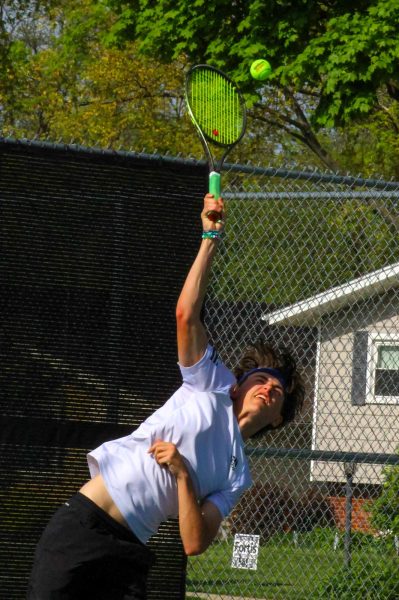STUDENTS, STAFF ADJUST TO REMOTE LEARNING, THINK ABOUT 2020-21 ACCOMMODATIONS
May 5, 2020
When freshmen Stella Fitzpatrick first heard about remote learning, she, like many other students, didn’t believe it would last very long.
But now, as the school year is coming to a close with remote learning instruction, Fitzpatrick has to adjust to what it’s like to be learning her school’s curriculum at home.
During remote learning, high schools are trying to get students to learn as much as they can. However, the effects remote learning might have on students going forward this fall leads to concern for some students like Fitzpatrick.
Fitzpatrick is trying to do the best she can to learn despite the fact that she’s doing less schoolwork. She knows that it’s hard for students, such as herself, because they aren’t learning the material in person; at school, she was able to ask her teachers questions easily and work with them.
Pre Calculus and Geometry teacher Katina Frericks is focusing on giving students as much help as possible by offering her students multiple assignments to do. For example, in her Geometry class, Frericks gives weekly challenges that aren’t the traditional material students would learn during the school year along with assignments on chapters her students regularly learn. Frericks also offers extra SAT practice.
However, Frericks knows that remote learning is far from ideal and sometimes struggles to know if students are actually learning.
“With this remote learning, I say, ‘Whatever questions you have — ask me.’ But it takes more for students to raise their hand [from remote learning] here … and for me to sense they’re struggling,” Frericks said.
Fitzpatrick is worried that she is learning less in classes such as math where she isn’t finishing the curriculum in the same way. Because, like Frericks said, she isn’t receiving the extra guidance she would normally have.
“I hope I will be ready [for Algebra II next year],” Fitzpatrick said. “It’s much harder to learn geometry, though, now … because math really builds on what comes before it, so if you miss a step, it could become challenging.”
Principal Greg Minter holds the same concerns as Frericks and Fitzpatrick, but recommends students to reach out to a counselor if they feel worried during remote learning.
If students do feel anxious or worried over the current situation, Minter explains that’s why Prospect is making sure counselors and school psychologists are still working with students.
Many teachers also do weekly check-ins with their students to keep tabs on their well-being. Fitzpatrick has noticed this in her classes and does think it’s beneficial to herself and other students.
“They’re reaching out more often and trying to help those who need to speak up,” Fitzpatrick said.
Since some students want to have extra enrichment, Minter knows that teachers like Frericks are giving extra opportunities. He also states that there are other ways to learn through the internet that students can pursue if they’re interested.
“I don’t necessarily know if the school has to be the only source of learning,” Minter said. “Where’s your interest or curiosity? If that’s there, you don’t necessarily need a teacher always to be guiding it … There’s infinite ways people can learn, and it doesn’t always have to be directed by a teacher.”
Going forth into the end of this school year, there will be no finals, but Minter says that there will definitely be more review at the beginning of the school year.
Frericks has decided on doing review in her classes to make sure that all students are on the same page next year; she knows that, especially in math courses, there could be some range in what students know coming in this fall.
“Everyone has to come into next year being ready to be challenged,” Frericks said. “ … We’re probably going to have to kick it up a little bit, and if we’re in it with each other and have positive attitudes and [are] ready to work, I think everyone will be able to succeed.”
However, in the fall, no one knows what is going to happen for certain, and Minter doesn’t believe that school will be the same as it used to. He says that they will wait for what the Centers for Disease Control and Prevention (CDC) recommends, but thinks that having 2,400 people in a building at one time might not happen by then.
“We have to be looking at all different kinds of options of ways to deliver instruction [in the fall],” Minter said. “That doesn’t mean we won’t have school and [that] kids won’t be coming to school, it just won’t be the same as it has traditionally been.”
Although, because students and staff have already been doing remote learning and adjusting to it, he’s confident that no matter what happens, they will continue to succeed in their classes.
Minter says that he will work with helping the incoming students adapt to Prospect like all freshmen from the middle schools this summer and fall once the school year is over.
Lincoln Middle School Principal Paul Suminski is trying to help his students adjust as well. Each day, students go on the district website to find their assignments. Parents are supposed to try to submit attendance every day for their child as well. Teachers can use any number of programs to communicate with their students –– Zoom, Google Chats, Google Classroom, Seesaw, etc.
Suminski said that he’s received good feedback from teachers among student participation. They are focusing on teaching the most important curriculum to know –– it’s more focused than before because of the situation.
Lincoln Middle School eighth grader Ava Lalich believes she will make her transition from middle school to high school just as well as if she finished the school year regularly. She is overall pretty content with what they’re doing in remote learning, but she is a little worried about classes like math where she doesn’t want to miss any units and standardized testing.
Suminski and Minter both know that while there’s uncertainty this fall, the best thing they can do is work with the situation in the best manner. They’re both grateful that their students have technology available to them through the iPads at Prospect and the Chromebooks at Lincoln to make remote learning instruction easier.
“[Through Zoom and other programs] we’re redefining what’s normal right now,” Suminski said. “That’s an adjustment we have to make with our students and staff.”























































































Joe Miller • Nov 8, 2020 at 8:02 pm
Spam comment detected.